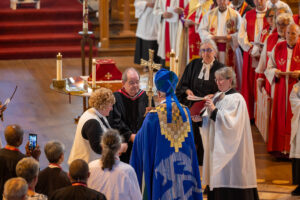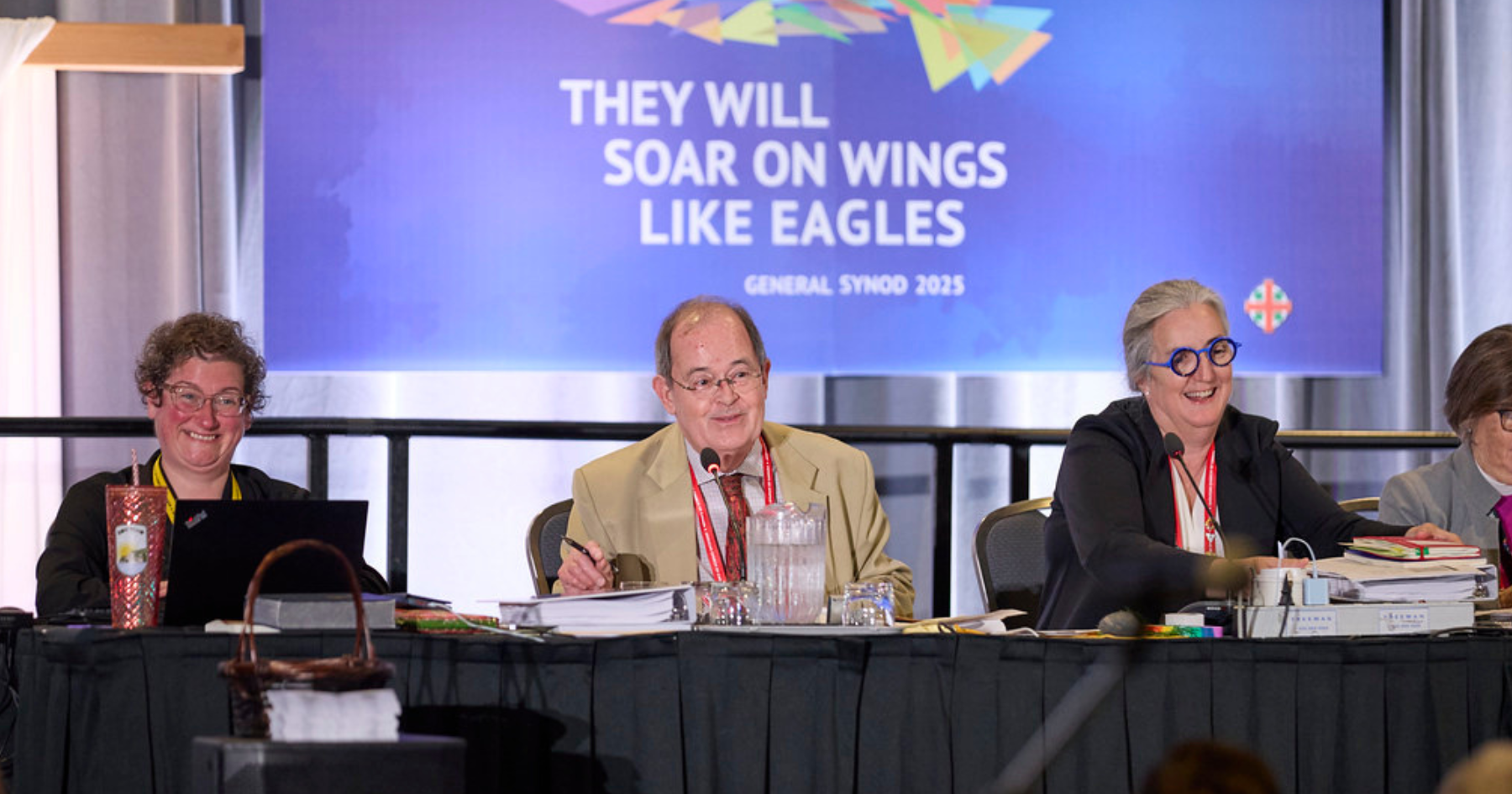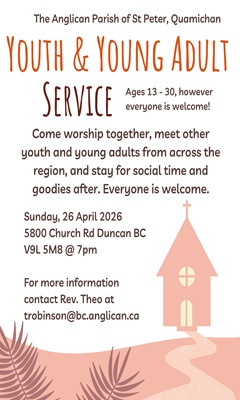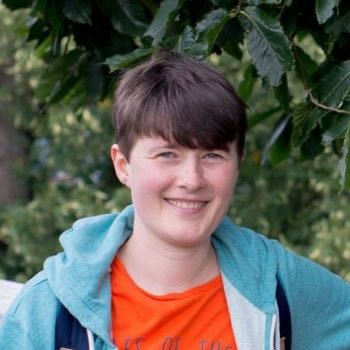Earlier this year, the 2025 recipients of the Anglican Award of Merit, which recognizes outstanding contributions by Anglican laypeople, were announced. Included in that list of names is Ian Alexander, a parishioner at Christ Church Cathedral, Victoria, and a lay canon of the diocese. Ian will be presented with his award by Archbishop Shane Parker, at the Order of the Diocese of British Columbia investiture service. The service will take place at Christ Church Cathedral, Victoria on Saturday, Oct. 25 at 10:30 a.m. All are welcome to attend.
Besides the various roles Ian has played in our diocese, at General Synod 2023 he was elected prolocutor, a role he filled through to the 2025 General Synod. When the then-general secretary took a leave of absence at the beginning of June, Ian also stepped into the role of interim general secretary. Faith Tides caught up with Ian to hear more about his time as prolocutor, with a front row seat to the growing calls for change in the Anglican Church of Canada. This interview has been edited for clarity.
Naomi: You’ve just finished your term as prolocutor. What’s been the most interesting aspect of the role?
Ian: Well, the church is at a fairly critical juncture. The status quo is not an option. It’s been interesting, to say the least, to see that realization sink in more and more widely and deeply across the church.
There’s no question that finances are constrained. As revenues at the parish level and diocesan level reduce, it inevitably reduces the resources that are available at the national level. Over the previous four-year cycle [2019-2023], we did a lot of work around defining the national church, and now that work is coming to fruition.
The national church has very little authority. We’re not a hierarchical church. Most of the real decision-making rests at the diocesan level. The national church’s role, as we’ve come to understand it, is one of connecting, convening and communicating. How do you do that when resources are limited? Well, you do it by identifying where there are pockets of expertise across the country and then connecting people. Figuring out new ways to do things when resources are limited, but needs are great, has been a very interesting challenge.
It’s also been fascinating to work with three very different, but equally gifted and committed, primates: Linda Nicholls, Anne Germond, and now Shane Parker.
I was quite surprised to see suggestions of getting rid of the role of primate and even getting rid of the national level of the church [in the Creating Pathways report]. Were you surprised to see those suggestions coming up or was that something that’s been discussed before?
I wasn’t surprised. I think the six pathways that the Primate’s Commission came forward with at the synod in London are refreshing. From time to time, any organization needs to really challenge its basic assumptions. Some of the pathways I find more attractive than I do others. But I wouldn’t shrink from looking at any of them. And I know that this primate is committed to exploring all of them in some depth in the next three years.
The period that I’ve been most involved at the national level covers the last six years. And that’s been a time of getting ready for change. This synod had to deal with a lot of very difficult issues, including stuff around finance, property, governance and so forth. I felt, and I think a lot of people felt, that it was one of the best synods that the church has had in quite a long time. And part of that is, I think, because we made a conscious decision to be open and transparent and not try to sweep anything under the carpet.
For the last six years there’s been a gradual movement towards thinking about change in a very significant and real way. By the time we were in London, Ontario, this summer, I think that the synod as a whole had come to that realization.
Could you tell me a little bit about your time as interim general secretary, what that role has entailed and what insights you’ve gathered from being in that role?
The general secretary went on leave a few weeks before synod and because of my existing role as prolocutor, I felt that I should offer to step up. Basically, what I said was, “I’ll help you get through synod.” I’d been involved with the planning already; I knew a fair bit about it. So, it seemed to make sense to help out on a short-term, voluntary basis.
It’s turned out to be a bit more than that, and so I agreed to continue in the interim role on a part-time contract basis, just to keep the office running smoothly and help with the transition to the new triennium, through to the end of September. Hopefully not much longer than that. Not if Marilyn [Ian’s wife] has anything to say about it — which she does!
What have I learned? What have I seen? One thing I’ve seen is that there is a small but dedicated team of people at Church House in Toronto who are doing fantastic work: both the staff that support general synod and the people who are responsible for particular ministry areas. They are small in number, they have fewer and fewer resources, but they are doing phenomenal work.
A second thing that I have learned is that there are a lot of people, a lot of Anglicans across Canada, who care very much about their church at every level. There is an incredible amount of generosity for Giving with Grace and the other fundraising activities of the national church, the Anglican Journal, the Anglican Foundation and Alongside Hope. There is great work going on in terms of both generating resources and distributing them where they are needed: to the Council of the North, to Indigenous ministries and all the rest.
And that’s a third thing: I’ve had a chance to work alongside Archbishop Chris Harper and Indigenous ministries a little more closely than I had previously. The energy and commitment that is going into the work of defining and building a self-determining Indigenous church inside the Anglican Church of Canada is really encouraging.
I’d sum it up by saying there are some really tough challenges ahead, and some really tough decisions that must be made, but we have a great group of people who are totally committed to it and who are also committed to the need for change.

It was really interesting watching the election and seeing Shane Parker get elected, rather than one of the four candidates we had been focused on for months. What was that experience like for you?
It was a once-in-a-lifetime experience to be sitting at that head table and looking out into the cathedral. I had to really go to school to learn the ins and outs of Canon III, which is the canon about the primate. There is an interesting provision in there, which says that after the second and subsequent ballots, a member of the house of clergy or of the house of laity can bring a motion to ask the bishops to send more names.
Now, the youth delegates traditionally have a day of meeting on their own before the synod convenes. Sheilagh McGlynn [coordinator of youth ministry for the national church] asked Tanya Phibbs [then-deputy prolocutor], Clare Burns [chancellor] and I to come and each sit at one of the tables where the youth delegates were having their dinner on the first night, chat with them, get to know them and tell them a little bit about synod.
Over dinner, all three of us made a point of telling the youth delegates about this slightly obscure provision of the canon, and they got quite interested in it. And lo and behold, on the day of the election, at the end of the second ballot, two of the youth delegates leapt to their feet, waving a piece of paper and saying, “We already have a motion written out, can we bring it to you?” The chancellor found it in order. And so, it was voted on. And that led to the request for more names from the house of bishops.
I’m so pleased that it was youth members of synod getting actively engaged, seeing what they felt was a need, coming to grips with the arcane ways that we do governance in our church and taking bold and decisive action. That to me is a good sign for the future of the church.
You’re getting the Award of Merit, which is the highest award for laity in the Anglican Church of Canada. You’ve been prolocutor and interim general secretary. What are your next steps going to look like?
In terms of my own career and life and work with the church, I’m laying down burdens. I’ve already put away most of my diocesan work. I’ve put away quite a bit of my cathedral work. And after this little interim time, I’m going to be wrapping up my work with the national church. In a way, I feel as if I’m standing on one shore and I’m watching the national church move across to a new place on the other side. And I feel very good about that. I feel good to have been part of the movement that got us to the point where we can say, yes, we have to take a leap.
One of the things that I am fortunate to get to do occasionally, and God willing will continue to do because it’s a tremendous privilege, is to officiate at Evensong at the cathedral every six weeks or so. I’m getting ready to deliver a little homily this coming Sunday [Editor’s note: this interview was conducted on August 26]. One of the lessons is from the Gospel of John and it includes the phrase where John the Baptist says of his cousin Jesus: “He must increase, and I must decrease.” That’s kind of how I’m feeling.




